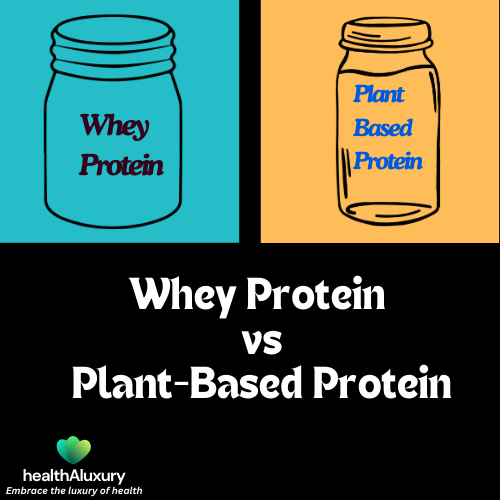Whey Protein vs Plant-Based Protein: Which Is Right for You?

Protein is a fundamental building block for muscle repair, growth, and overall health. With numerous options available, the debate between whey protein and plant-based protein is more prominent than ever. In this guide, we’ll dive deep into their benefits, differences, and factors to help you decide which is better suited for your needs.
What is Whey Protein?
Whey protein is a byproduct of the cheese-making process, derived from milk. When milk is curdled, it separates into curds and whey. The curds are used to make cheese, and the liquid whey is processed and dried into the protein powder we’re familiar with.
It’s important to note that whey protein is a complete protein. This means it contains all nine essential amino acids, the building blocks that our body needs but cannot produce independently. This makes whey protein an excellent source of high-quality protein that’s easily accessible.
Refer this – http://www.healthaluxury.com/protein/why-whey-protein-is-so-popular/
What Is Plant-Based Protein?
Plant-based protein comes from sources like peas, rice, hemp, and soy. These proteins are often blended to create a complete amino acid profile, making them an excellent option for vegans and individuals with dietary restrictions.
Benefits of Plant-Based Protein:
- Easily Digestible: Most plant-based proteins are gentle on the stomach.
- Rich in Nutrients: They often come with added fiber, antioxidants, and vitamins.
- Environmentally Friendly: Plant-based proteins have a lower carbon footprint compared to animal-derived options.
Drawbacks of Plant-Based Protein:
- Incomplete Proteins: Some plant proteins lack certain essential amino acids, though blends can address this.
- Milder Taste: Plant-based proteins may have a distinct flavor that some people need time to adjust to.
Whey Protein vs Plant-Based Protein: Nutritional Comparison:
| Feature | Whey Protein | Plant-Based Protein |
| Amino Acid Profile | Complete | Often incomplete (unless blended) |
| Digestibility | Fast absorption | Slower but steady release |
| Allergen Risk | High (lactose/dairy) | Low |
| Added Nutrients | Minimal | High (fiber, vitamins, minerals) |
| Environmental Impact | Higher footprint | Eco-friendly |
Whey Protein vs Plant-Based Protein: Which Protein Is Better for Muscle Building?
For muscle building, the speed of protein absorption and leucine content are critical factors. Whey protein is considered superior in this regard because of its high leucine levels and rapid digestion.
However, plant-based protein can still be effective when consumed in the right quantities or as part of a blend that completes its amino acid profile. For example, combining pea protein with rice protein creates a balanced option for muscle recovery.
Whey Protein vs Plant-Based Protein: Which Protein Is Better for Weight Loss?
Both whey and plant-based proteins can support weight loss, but the choice may depend on individual preferences and tolerances:
- Whey Protein: It’s more satiating due to its high leucine content, potentially reducing cravings.
- Plant-Based Protein: The added fiber in plant-based powders promotes fullness and aids digestion.
Whey Protein vs Plant-Based Protein: Allergies and Dietary Restrictions
When choosing between whey protein and plant-based protein, dietary restrictions play a significant role:
- Whey Protein: Avoid if you have lactose intolerance or a dairy allergy.
- Plant-Based Protein: Suitable for vegans, vegetarians, and those with dairy sensitivities.
Some plant-based proteins are also free from common allergens like soy and gluten, making them versatile for various dietary needs.
Whey Protein vs Plant-Based Protein: Taste and Texture
Taste and texture are subjective, but here’s a general breakdown:
- Whey Protein: Often smooth and creamy, making it ideal for shakes. Available in numerous flavors.
- Plant-Based Protein: May have a slightly grainy texture and earthy taste, although recent formulations have significantly improved.
Experimenting with different brands can help you find one that suits your palate.
Whey Protein vs Plant-Based Protein: Cost Considerations
Whey protein is often more affordable due to its widespread availability. However, premium whey isolates can be costly. Plant-based protein prices vary depending on the source and blend but may be higher due to added nutrients and processing.
Whey Protein vs Plant-Based Protein: How to Choose the Right Protein for You
To decide between whey protein and plant-based protein, consider these factors:
- Dietary Needs: Do you have allergies or dietary restrictions?
- Fitness Goals: Are you focused on muscle gain, weight loss, or general health?
- Sustainability: Do you prioritize eco-friendly options?
- Budget: How much are you willing to spend?
- Taste Preferences: Which flavor and texture do you prefer?
Whey Protein vs Plant-Based Protein: Conclusion
The debate of whey protein vs plant-based protein ultimately boils down to personal needs and preferences. If you’re looking for rapid muscle recovery and a complete protein profile, whey protein might be your best bet. On the other hand, if you value sustainability, dietary inclusivity, and added nutrients, plant-based protein is an excellent alternative.
By understanding the benefits and drawbacks of each, you can make an informed decision to support your fitness and health journey.
